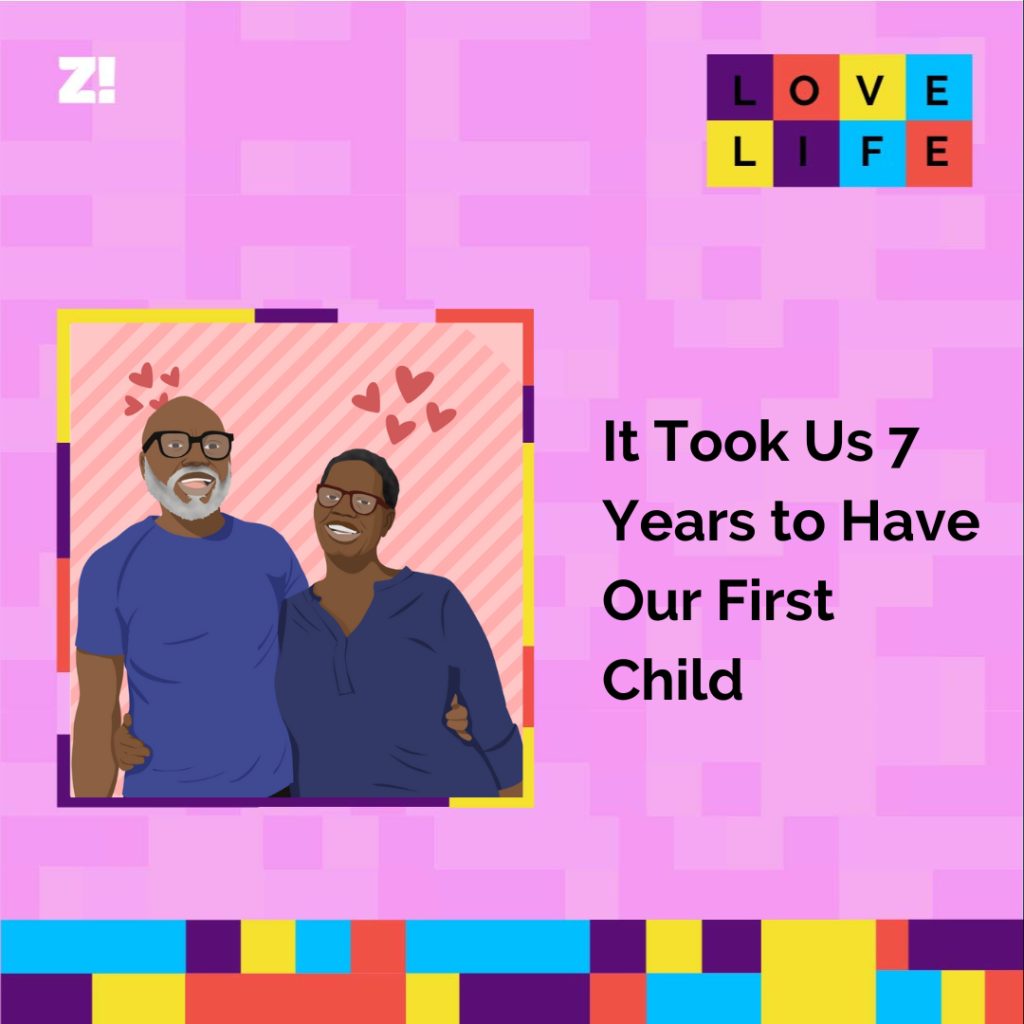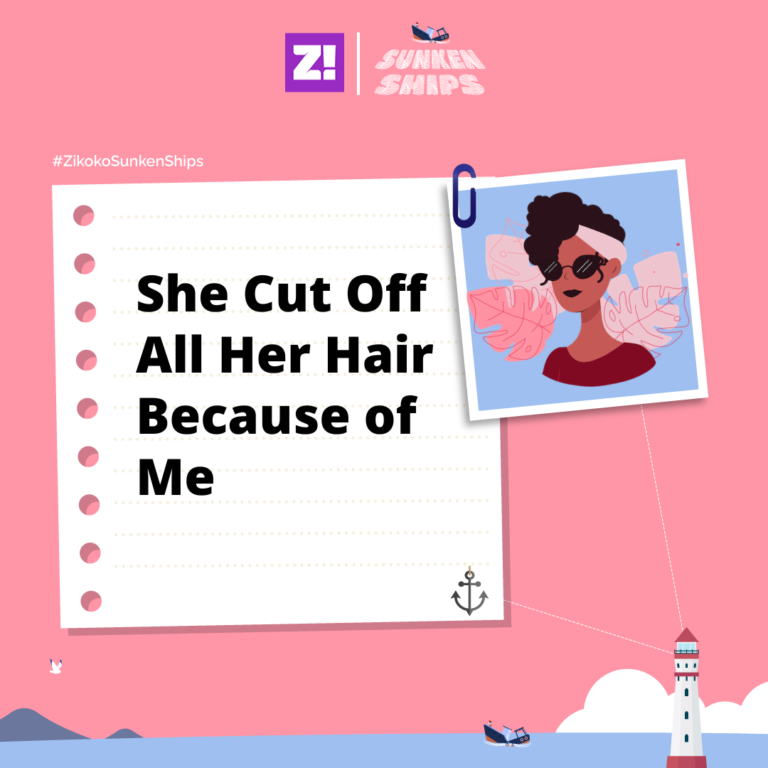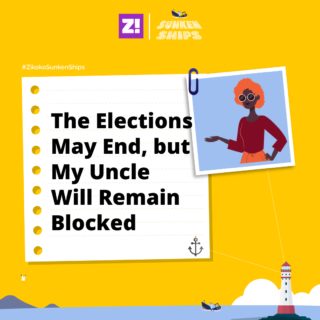Love Life is a Zikoko weekly series about love, relationships, situationships, entanglements and everything in between.
Ighodalo* (61) and Esohe (59) met at the burial of Ambrose Alli in 1988. After refusing to date him because he drank and smoked, they moved to navigating a long-distance relationship with financial difficulties and fertility issues.

What’s your earliest memory of each other?
Ighodalo: We met for the first time in 1988, at the burial of the former governor of Bendel state in Ekpoma, where I worked as a tax officer.
While at the burial to pay respects and be a part of history, I saw her. This woman was slim around the waistline with a big bumbum. Very fine shape. When I struck up a conversation with her, she found a way to bring everything back to God. I told her I wanted to date her. She refused, but we still kept in touch.
Esohe: It’s not that I didn’t find him interesting. He’s soft-spoken and tall, which is something I’ve always liked, but I wasn’t interested in a relationship then. I was too focused on school, family and God.
The next time I saw him was a couple of days later. I was looking for my school ID card so I went to his office to ask if I maybe left it with him. I didn’t, but it was nice to see him again.
Did you find the card?
Esohe: Yes. On a bus.
And did you see each other again?
Ighodalo: Yes, I found out where she lived.
Esohe: He was trailing me.
Ighodalo: At my office, we had a driver who took us around. She told me about the family she stayed with while she was in school, and I realised I went to school with some of her family members. The driver knew their house, and it wasn’t too far from the university, so I started visiting her once in a while.
Esohe: A few months after we met, I decided to start going out with him. He’s such a kindhearted and gentle man. Plus, my uncle in Benin kept talking about how I should give him a chance. The problem was he was into a lot of wicked things. He smoked, drank, slept around and was a cultist. But as we spent more time together, he willingly started to drop some of those habits.
Ighodalo: She was constantly preaching to me and trying to get me to change my ways. I started doing those things a lot less. She helped me see there was more to life than the things I was indulging in.
RELATED: Love Life: The Day We Started Dating Was the Day I Stopped Smoking
And the rest of the relationship?
Esohe: Pretty smooth, actually. Well, save for when I went back to Lagos to I live with my brother and we didn’t see each other for six months.
In 1988, Babangida wanted to enact this economic policy called the Structural Adjustment Program (SAP), to tighten our belts while they kept having lavish events. People’s wages were brought down, and living conditions worsened, but government officials didn’t cut their own pay. Protests broke out because people were tired, and most of them were championed by university students. So, universities closed down. Mine was shut for six months.
Ighodalo: We kept writing to each other, but letters across states took an average of a week to get delivered. By the time my letter got to her, whatever I was talking about might’ve passed. It was tough, but we encouraged each other through the letters.
After the riot, whenever long holidays came around, she’d go back to her house in Lagos. Sometimes, I’d go see her there, and sometimes, she’d come see me. The roads weren’t so bad, and you could travel from Lagos to Benin in 3-4 hours.
How long did this courtship last?
Ighodalo: We dated for six years.
Esohe: We were on and off during that period because, sometimes, he’d do something to annoy me. When he did, I wouldn’t reply his letter. Eventually, his sister would beg me before I reply him.
Olden days ghosting. LMAO
Esohe: But also, we thought it was wise for me to finish school, NYSC and start working before getting married. At least, that way, we’d have a stable life and could both financially contribute to the relationship.
Ighodalo: We lived in two different states, and I wanted to marry her before someone who lived closer could. I proposed to her at a resort with two of my friends present. She said yes, and I was so overjoyed. We got married a year later.
What were you doing for one year?
Esohe: Planning. We didn’t have a lot of money, so we didn’t want something large. In fact, we wanted to get married on a Thursday. Something low-key and intimate, but my elder brother was not having it. He asked me if I was pregnant because he didn’t understand why I’d want to get married on a Thursday.
In July 1994, we did the registry and traditional marriage in Ekpoma, where my father lived. It was supposed to be in June, but one of my uncle’s wives died and the burial was in June. After that, I stayed back in Ekpoma for a bit. Before I knew what was happening, my brother had started making plans for the white wedding. He’d printed the IV, secured a venue, and his wife’s mother was to cater the event.
Ighodalo: He did so much, so I spent my money on outfits for the wedding. I remember the shoe I bought cost ₦3,500. To put into perspective just how much I had to save for it, I was earning ₦2,800 a month. But it was worth it. The sole was made in Spain and the top was designed in Italy. I still have that shoe today.
Esohe: We got married in August of 1994, and everything went great. It was small but very lovely.
Why so long between the traditional and white wedding?
Esohe: That’s how things were done then. People hardly did both in the same weekend.
Ighodalo: People could go up to a year between traditional and white weddings.
Esohe: After the wedding, I stayed back in Lagos, in the apartment I’d moved to while he went back to Benin to continue his job. I’d occasionally visit him, and he’d sometimes come here. During one of my visits, I saw a cultist regalia in his wardrobe. I was angry and confused because he’d told me he was no longer a cultist.
Ighodalo: And I wasn’t. I just never got around to getting rid of it. I’d lost interest in cultism when they started killing people.
When we started, we had ideologies and principles, and at a time, I headed the movement to spread across academic institutions. But then, the deaths began, and I washed my hands off of it. That’s why when she asked if she could burn it, I agreed.
How did it feel to be married from a distance?
Esohe: We did long distance while we dated, so for the first year of marriage, I thought we could cope. But it was hard.
After two years, I opened my gate one day to see him waiting for me with all his load. He told me he’d quit his job and moved Lagos. I was confused.
RELATED: Love Life: We Broke Up Once But Still Got Married
Ighodalo: She was earning over ₦3,000 a month, which was more than what I earned. I couldn’t ask her to quit her job and stay in Benin where she’d earn less. Especially because Lagos had more opportunities. I felt it’d be easier for me to find a job that paid well than if I’d stayed in Benin.
Esohe: I wish he’d discussed it with me, but there was nothing I could do at that point. I opened the door for him, and we started a new phase of our life together.
Did he get a new job?
Esohe: It actually took a while before he could. He tried his hands at various businesses, but hardly anything concrete came out of it. We needed to take care of ourselves and my salary wasn’t enough, so I started selling ankara, ties, shirts and all, just to make up for it. I was a secretary in a finance company, so I sold these things to my coworkers. My husband would help me market my business to some of his rich friends too. That’s how we were able to hold body.
We had this small white bucket in our room where we kept all the money we made. Whenever anyone needed money to go out or do anything, we’d just take from the bucket. There was a lot of transparency when it came to handling our finances.
Ighodalo: I didn’t like how we lived, and it frustrated me, but she was always so reassuring. Whenever one person struggled, the other picked it up.
Can’t imagine how stressful that must’ve been. Were there kids involved at this time?
Esohe: No. We didn’t have our first and only child till after seven years of marriage. We never wanted a large family. My mum had nine children, and his had eight. We knew what large families were like, so we weren’t interested.
Ighodalo: I was content with my wife and our apartment in Lagos, but she? She was worried.
Esohe: It’s not like his family members were mean to me. If anything, it was my own family that made weird comments. I remember one of my elder sisters came to Lagos and refused to visit me. When I asked why, she said she doesn’t visit women without children. It hurt, but what could I do except pray and cry?
Ighodalo: That was a very trying period for us, and she cried a lot. It broke my heart to see her this way, especially because she’s too kind. She always puts others above herself, and they took it as an opportunity to disrespect her. It made me angry.
What did you do about it?
Esohe: In 1997, we had a neighbour who always came to our house to collect oil, salt and other things. One day, she came as usual, and after I gave her the oil, she told me she doesn’t think I want children. That didn’t I read the way Hannah in the Bible cried to God? That I should beg God like that.
When she left, I started crying. He was in the room and knew our neighbour had come, but he didn’t know what she said to me. I refused to tell him so he wore his shoes and told me he was going to her house. She must explain to him what she said to make his wife cry.
I didn’t want a scene so I told him, and he forbade her from stepping foot in the house again. He always had my back and refused to let people use childbirth to stress me.
That’s so sweet. How did pregnancy eventually go?
Esohe: It was funny and a bit scary. Funny because he fussed a lot. I started living with my elder brother after the first trimester because I almost had a miscarriage in my third month. There were some things the doctor recommended I eat, and my sister-in-law was very happy to make them.
Ighodalo: The fifth month of her pregnancy, I came to carry her from their house. I wanted to be involved in the process of raising my child, even while it was still in the womb. I grew up in Edo state. Amala is not something we eat regularly, so my mother never taught me how to make it. But I learnt how to make Amala the way my wife liked it.
Esohe: I know I got on his nerves a lot while I was pregnant. In my eighth month, I wanted to buy clothes for the naming ceremony. I went with a friend of mine to Lagos Island, but I had told my husband I was in Yaba. If he knew I was going to Lagos Island, he wouldn’t have let me.
As we got to the bus stop closest to my house, on our way back from the market, my legs stopped working. I don’t even remember how I got home, but they dropped me off for my husband.
Ighodalo: I asked her what happened and she started crying. I just boiled water to help her massage her legs. She doesn’t listen.
LMAO. Y’all are so cute. And the baby?
Esohe: She took me almost a full day to deliver. I wanted a natural birth, but I had a fibroid operation two years prior that led to keloid growth.
Ighodalo: I wanted to be with her while she delivered, but when they mentioned surgery, I started crying. The doctor sent me out of the room.
Esohe: My husband might seem intimidating physically, but he’s an emotional baby. Anything makes him cry. When our daughter was going to boarding school, this man couldn’t follow us to drop her off because he kept crying. She was even the one consoling him.
Ighodalo: I’m sensitive. Plus, the women in my life are much stronger than I am.
Esohe: Eh hen, back to the birth. Once he signed the documents for the surgery, I was out in under an hour.
Ighodalo: I was so happy when I held our daughter in my arms. When I left the hospital to get some things, I was telling everyone on the road that my wife just had a baby.
What was marriage like after the child?
Esohe: I won’t say it was difficult, but it certainly wasn’t easy. He’d started a transportation business, and it was doing okay. I had quit my job, so I became a full-time entrepreneur. We struggled, but we had each other.
Ighodalo: Eventually, in 2011, I got a paid job and that made everything so much easier. My salary was expected income and we planned around it. Anything extra we made was for wants.
Esohe: It was from his salary we’d get feeding money, school fees and rent. The other not-so-important things came from our businesses.
Now, we’re in a better place financially than when we started. And I’m grateful that as things got better, he prioritised my ease and comfort. He bought me a car I liked, buys me expensive clothes and anything my heart desires.
Ighodalo: I made a promise to take care of her, and I’m happy I can finally do it the way I’d like. I don’t want my wife or daughter to ever lack anything.
Esohe: The only problem is with this new job, we’ve not lived together for up to a year. He only comes during the weekends and calls every day. I can’t wait for him to retire.
Ighodalo: Technology is really amazing because I get to talk to my wife every day even though we’re not physically together. My daughter even taught us how to do video calls, and we try when the network allows it. We even take selfies.
You people are too cute, please. Are there things your partner does you don’t like?
Esohe: When he got this job, he had to deal with people he shouted at a lot. Sometimes, he’d bring that spirit home. My daughter cleared him, but I was calmer about it. I told him I didn’t appreciate his tone, and he corrected himself. He’d shout sometimes because he’s so organised and time conscious, but I’m not really like that.
Ighodalo: She’s too kind. She constantly does things that cause her stress, but she doesn’t mind. As long as whoever she’s helping is happy, she’d break one of her legs. I keep begging her to be a bit more selfish. Also, she doesn’t like the cold. I do. Right now, she’s made me put off the fan because she’s cold.
Esohe: But the weather is cold, why do you need the fan on? It’s because he wants to freeze me and keep me in his house. That’s why my room doesn’t have an AC. So he won’t kill me.
LMAO. How’d you rate your love life on a scale of 1-10?
Ighodalo: 9.5. Nothing is perfect, but she’s as close to perfect as I can get. If I could come to this life again, I’d marry her without thinking twice.
Esohe: A 9.5 here too. I’m grateful I married someone so kind and sweet to me.




